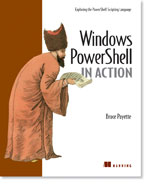/\/\o\/\/ PowerShelled
This blog has moved to http://ThePowerShellGuy.com Greetings /\/\o\/\/ $AtomFeed = ("Atom.xml")$PreviousItems = (" PowerShell : Setting SendAs permission in Exchange... "," PowerShell : Active Directory Part 10 (AD Browser) "," PowerShell "," PowerShell : How Do I randomize a list, and remove... "," PowerShell : Can you do that less cryptic ? "," PowerShell : How can I tell whitch numbers are mis... "," PowerShell Active Directory Browser teaser "," Powershell, Has my Dell a dangerous battery Part 2 ? "," PowerShell, Has my Dell a dangerous battery ? "," PowerShell Adding -verbose switch to functions "," ")
Thursday, September 07, 2006
PowerShell : Learn about the HashTable Object and other Collections
In the TechNet ScriptCenter there is a series : Sesame Script If you’re new to scripting, these articles will teach you the basics and help get you started.
(Check out also the Sesame Script Archives , although the Series is aimed at beginners also some more advanced topics get explained, an all articles are a good read.), also the concepts are often also usable in PowerShell so even they are in VbScript they still can be a good resource for learning PowerShell)
In this part of the series : Sesame Script: The Dictionary Object , a Dictionary Object is discussed
In PowerShell we have a similar object called a HashTable that works almost the same and other .NET Collection Classes we can use that work like this, so this concepts are also good to know mastering PowerShell, the WMI example might not be the best example as it is an collection of objects already, but as an ArrayList is used also in for example a Select statement for more info also PowerShell and Active Directory Part 5 so is good to understand, and if you did not get the use in the Select completely its also good to get this background.
the HashTable unlike many other things do not enumerate on the pipeline. this can be a catch Wmi-Help Part 1
In this post I will follow the Sesame Script Article with similar command in PowerShell and point out the PowerShell Specifics, be sure to read the part in the "Sesame Script" article completely first.
An Example that Doesn’t Use the HashTable Object
PoSH>gwmi win32_service | fl name,state
name : Alerter
state : Stoppedname : Eventlog
state : Running
The next example about Filtering
PoSH>gwmi win32_service -filter "state = 'Stopped'" | ft name,state
name state
---- -----
Alerter Stopped
ALG Stopped
An Example that Does Use the Dictionary Object
PoSH>gwmi win32_service |% {$ht = @{}}{$ht.add($_.name,$_.state)}
PoSH>$htName Value
---- -----
Eventlog Running
Alerter Stopped
First note we can create a HashTable like this in PowerShell
PoSH>@{} | gm
TypeName: System.Collections.Hashtable
Name MemberType Definition
---- ---------- ----------
Add Method System.Void Add(Object key, Object value)
Clear Method System.Void Clear()
PoSH>@{name = 'mow'}
Name Value
---- -----
name mow
PoSH>@{'name' = 'mow'; 'shell' = 'PoSH'}
Name Value
---- -----
name mow
shell PoSH
Listing the Names of Stopped Services
PoSH>$ht.keys |? {$ht."$_" -eq 'Stopped'}
Alerter
ALG
Running :
PoSH>$ht.keys |? {$ht.Item($_) -eq 'Running'}
Eventlog
W32Time
Other Things You Should Know About the Dictionary Object
PoSH>$ht.Contains('Alerter')
True
PoSH>$ht.Contains('foo')
FalsePoSH>$ht.ContainsValue('Running')
True
PoSH>$ht.ContainsValue('Alerter')
False
For the rest see the Get-Member output
you can get to the DictionaryEntries it contains by calling the GetEnumerator yourself :
PoSH>$ht.GetEnumerator()Name Value
---- -----
Eventlog Running
Alerter Stopped
PoSH>$ht.GetEnumerator() | gm
TypeName: System.Collections.DictionaryEntry
Name MemberType Definition
---- ---------- ----------
Name AliasProperty Name = Key
Equals Method System.Boolean Equals(Object obj)
get_Key Method System.Object get_Key()
get_Value Method System.Object get_Value()
GetHashCode Method System.Int32 GetHashCode()
GetType Method System.Type GetType()
set_Key Method System.Void set_Key(Object value)
set_Value Method System.Void set_Value(Object value)
ToString Method System.String ToString()
Key Property System.Object Key {get;set;}
Value Property System.Object Value {get;set;}
You can also see more advanced examples of working with the HashTable Object in an MSH post (nothing changed here) here :
: Get AD info into a nested HashTable from MSH , (also a good read if you follow the AD series, as this also contains info about how to construct the Query for a Search of Active DIrectory using a directory Searcher)
Also use get-Member well ( Strange behavour of get-member on DataTables ), and Check out the Other collection members :
Other Usefull Collections
PoSH>$h = new Collections.Hashtable
PoSH>$h | gmTypeName: System.Collections.Hashtable
PoSH>[System.Collections.ArrayList](1,2)
1
2PoSH>,[System.Collections.ArrayList](1,2) | gm
TypeName: System.Collections.ArrayList
PoSH>$s = [System.Collections.Stack]('a','b')
PoSH>$s.count
2
PoSH>$s.pop()
b
PoSH>$s.count
1
PoSH>,$s | gmTypeName: System.Collections.Stack
PoSH>$sl = new System.Collections.SortedList
PoSH>Get-Member -InputObject $slTypeName: System.Collections.SortedList
PoSH>$q = [System.Collections.Queue]('a','b')
PoSH>$q.Dequeue()
a
PoSH>,$q | gmTypeName: System.Collections.Queue
You see that this basic collection logic and get-member, can get a whole lot of possibilities next to a simple array to store Objects.
and you can use get-member-inputObject to list the methods of the Collection.
Greetings, /\/\o\/\/
Tags : Monad msh PowerShell
